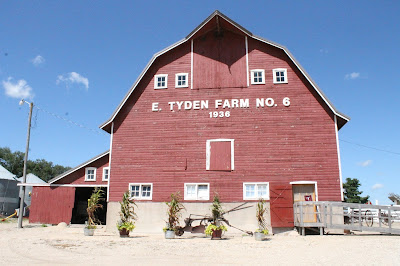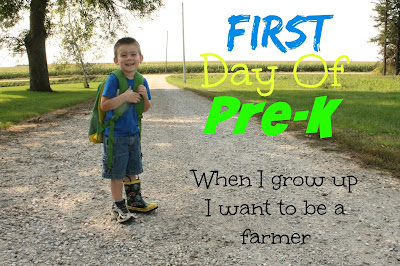* I received complimentary admission to facilitate my review.
All views and opinions shared are my own. *
All views and opinions shared are my own. *
Agri-tourism is a growing area of interest in Iowa - from going to the National Toy Tractor Museum in Dyersville, to touring the World Food Prize in Des Moines, to visiting Blue Bunny in Le Mars, there are many options on how to get a look at the wide world of agriculture. One fun trip that the kids and I were able to take last week before school started, was a tour of Tyden Farm No. 6 near Dougherty, Iowa (which is about 30 miles away from our home). We had a great time touring this 10 acre homestead, owned and operated by Ted and Judy Pitzenberger, with the North Iowa Bloggers.
 |
| The North Iowa Bloggers in front of the Tyden Farm No. 6 Barn (Photo courtesy of Donna Hup of donnahup.com) |
Who is Emil Tyden? Emil Tyden was a Swedish immigrant who arrived in America in 1882 as a teenager with only $20 in his pocket. He worked various jobs across the United States, including working for the railroad and serving in the Army as a "$1 a year man". While working for the railroad he invented, the Cargo Seal, which kept (and still keeps) train cargo safe and secure. At the same time he went on to creating one of the world's first automation systems to help supply the mass amount of Cargo Seals needed in Hastings, Michigan - a decade before Henry Ford started mass producing automobiles.
In 1920, a fire
destroyed his Cargo Seal factory so Tyden resolved this issue by entering the
fire sprinkler business. He started manufacturing fire sprinklers and
valves, and today, you can still see his product in office buildings across the
world. Tyden had over 200 patents, and while he loved inventing and made
his wealth in manufacturing, he had a love for agriculture and farming.
 |
| Ted
Pitzenberger telling us about the cement they made on the farm including for the cement water tower you see to the left of him and a cement corn crib not pictured |
So with his profits, he
invested in farm ground in the Dougherty and Greene, Iowa area during the Great
Depression. His farms were well respected in the area. They
employed many people during a time of high unemployment, and they were always on
the cutting edge of technology. His farms were some of the first in the
area to have cement and electricity.
 |
| MP and LP had a lot of fun on the tour, especially in their large garden area |
Why should I look into Agri-Tourism for my next trip? Agri-Tourism is a great way to help better understand and appreciate the land and the people who live and work on it. Many aspects of the agricultural landscape have changed over the years, so it a great way to learn about the science that goes into farming - something that Emil Tyden was very proud of. Agri-Tourism is also simply a lot of fun where you can get a personal look and experience into agriculture.
 |
| In
their museum, located in the old hog house, I was drawn towards their kitchen display |
Touring Tyden Farm No. 6
was a lot of fun for us to see what farming was like decades ago. It was
also great to see the pride that the Pitzenberger's take in Tyden's story and
their own farming heritage. They not only have several farm implements
and buildings that were used on the Tyden Farms over the years, but they also have
a museum with several of their family's memorabilia and history. You can
tell how much farming is a family business and how agriculture really built and
supported communities in the area.
You can learn more about
Tyden Farm No. 6 by visiting their website, or by
scheduling your own tour by contacting Ted and Judy Pitzenberger at
641-426-5277 or tyden6@netins.net.
Have you ever visited
any Agri-Tourism destination before? If so, where? What did you like
about the Agri-Tourism experience? Remember to Comment for a Cause!


















